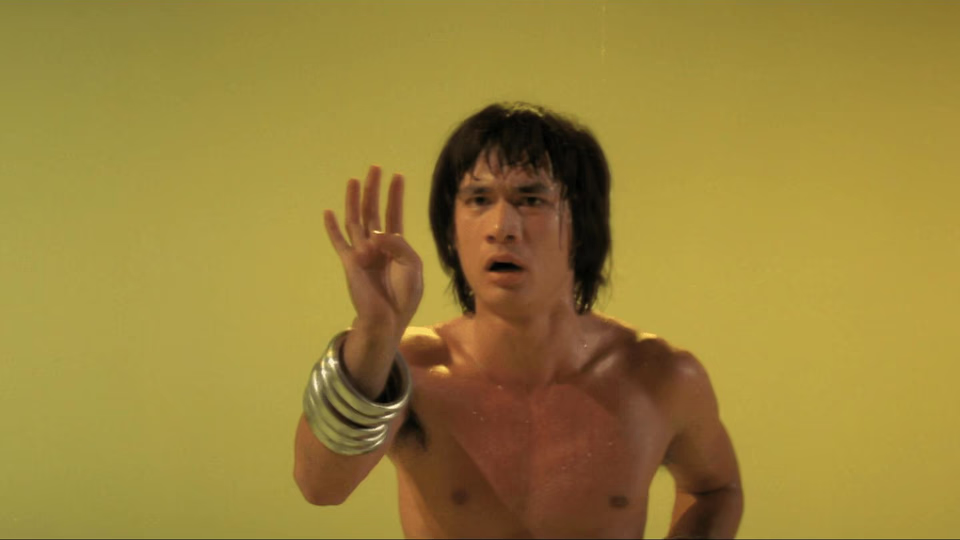Disciples of Shaolin

If you stick with it, Disciples of Shaolin offers surprising depth and style.
The opening credits begin with star Sheng Fu shirtless in a yellow room doing katas. Lots of close-ups on his sweaty body. After a few minutes, we get Fu in a white room doing katas. The combined sequence stretches for five minutes. Compounding matters, Fu does these same moves throughout the film and writer-director Cheh Chang never misses an opportunity to cut to a close-up of his sweaty, shirtless torso.
Once past the credits, the plot will feel familiar. Fu plays a young man named Guan, who arrives in town from his rural village and gets a job at a textile mill. A naïve bumpkin, he flirts with a wholesome young woman and causes friction at work in a semi-slapstick manner by stealthily touching his dirty feet to the backs of his superiors, leaving glaring footprints.
Conflict arises when a rival mill ambushes Guan’s coworkers, crippling them if they won’t switch mills. Things look dire, with the workers threatening to quit until Guan intervenes in a subsequent ambush and saves the day, revealing his exceptional kung fu skills. This gives the workers hope.
Guan trains the workers, leading to a grand showdown with the rival mill’s top fighter. In a brutal battle, Guan defeats the rival and wins his coworkers’ adoration as they hoist him on their shoulders.
A lesser film would end here, but not Disciples of Shaolin. Instead, the film explores what happens after the big victory. Guan gets promoted to foreman. The big boss hires a sex worker, Chu, to keep Guan happy and the wholesome young woman is forgotten. Guan also starts drinking.
From here, the film could have retread similar ground to Chang’s earlier film, The Boxer from Shantung, and followed Guan’s ruthless climb to the top, but again, Disciples of Shaolin surprises.
A genuine romance blooms between Guan and Chu, effectively communicated with a single scene where they flirt, laugh, and chase each other before Guan leaves. As she closes the door behind him, Chu catches herself still smiling and realizes she has developed true feelings.
In a refreshing twist, Chu doesn’t morph into a damsel in distress. She doesn’t figure into the remaining plot at all, but her romance with Guan lends nuance to both their characters and ups the emotional stakes. In the finale, a double-cross leads to a wound, rendering Guan vulnerable, culminating in another climactic fight as Guan seeks to vanquish the rival mill.
But for what?
In an unexpected show of depth, Chang foreshadows Brian De Palma’s reimagining of Scarface as a nihilistic capitalist critique by showing the mill owners’ complete disregard for their employees except as commodities to be exploited. Guan’s boss shows more concern for his pet crickets than his own employees, even Guan, highlighting the ultimate futility of Guan’s climb up the figurative corporate ladder. It’s a thoughtful contrast that’s executed with a light-enough touch to avoid overshadowing the narrative.
As Guan, twenty-one-year-old Fu evokes Bruce Lee’s swagger and foreshadows Jackie Chan’s more comedic approach. I struggled with his early comedic scenes, but appreciated the restraint Fu shows as the film progresses, settling into a convincing middle ground with the character.
Second-billed Kuan-Chun Chi plays another fighter from Fu’s village. It’s a stoic, one-note role, but Chi delivers in the part.
Visually, Chang does a solid job with the fight scenes, showcasing the actors in space and keeping the camera moving with the action. But the film’s visual highlight comes in the climactic battle, when Chang shifts to a near-sepia black-and-white. It’s an inspired choice that gives the battle an epic quality and heightens the verisimilitude, as the blood effects transform from technicolor red to shimmering black. Even better, in contrasting an earlier sequence, the black-and-white transition ties the film together in an unexpected manner.
This stylistic flourish proves yet another surprise in a film teeming with them. Provided viewers can get past the bloated credits and early attempts at semi-slapstick comedy, Disciples of Shaolin should prove rewarding to kung fu fans.